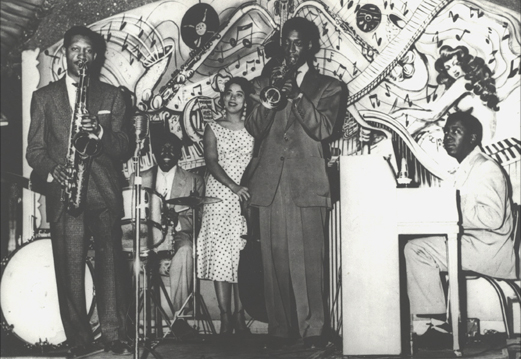

Revision note. We are bringing our coverage of Willie Jones' session with Buster Bennett up to date, and adding some information about his only single as a leader, Vee-Jay 121.
Willie Jones is one of the more intriguing pianists on the Chicago scene of the late 1940s and 1950s. He was admired by Sun Ra and Andrew Hill, sought after by some musicians, imitated by a few, shunned as too weird by others. According to Red Holloway, Chicago musicians called him "the piano wrecker." He has never gotten any attention outside of Chicago.
In his series of articles that reminisced about the Chicago nightlife of the 1940s and 1950s, Ted Watson wrote, "Willie Jones, the elbow-bamming pianist, who was a sight to watch and listen to, had his selected crew doing chores at the Macombo [sic] Lounge opposite Tom Archia and Illinois Jacquet" ("When Trumpet Was in Flower," Chicago Defender, August 8, 1974). That should be Macomba. And Jacquet never held down a gig there, though we may fairly assume that while in town he participated in the Macomba's legendary jam sessions.
Bobby Blevins, who played piano and organ with the Dozier Boys, among others, says: "Willie Jones could do that locked-hands stuff faster than George Shearing... Those old uprights weighed half a ton, but he could make an upright piano jump on the bandstand" (interview with Robert Campbell, August 1998).
According to tenor player Harold Ousley, Jones got the piano moving with his knees: "He was full of energy, wearing the piano out" (interview with Armin Büttner, October 1999). Ousley said that the people in the clubs liked Jones' playing so much because he was such a great entertainer: "He was playing so physically that he got everybody's attention." Blevins refers to Willie's brother playing piano as well; this may have been Claude R. Jones, who made several recording sessions in the 1950s with Johnny Pate and Eddie Johnson. Claude Jones played some thick block chords, but in a more sedate fashion than Willie did.

Here is Andrew Hill's appreciation: "Willie Jones played like Milt Buckner, but then he was into the new music aesthetic where he used to listen to things like Lukas Foss' 1950's music and stuff, so I would call him an early Cecil Taylor, someone who would place their style on a 20th century composer" (interview with Ted Panken on WKCR-FM, June 26, 1996).
Alto saxophonist Marshall Allen, a musician who was active on the Chicago scene in the 1950s and now leads the Sun Ra Arkestra, tells us that Sun Ra studied Willie Jones closely, "standing next to him, watching his fingers" (interviewed by Armin B&umml;ttner, March 28, 2001).
Thanks to the Chicago Federation of Musicians Union Death Files (1940-1979) in the Chicago Public Library, we are finally able to provide some biographical details for Willie Jones. He was born William Marvin Jones in Vicksburg, Mississippi, on February 21, 1920. It appears that everyone called him Willie from infancy on; he is known by that name on his Social Security documents and his application to the Musicians Union. He served in the military in World War II and joined the Musicians Union in Chicago on November 26, 1945. At the time, his mother, Irene Jones, was living at 1447 West 14th Street on the West Side.
Willie Jones was first mentioned in print in Down Beat for October 7, 1946. At this time the Wally Hayes group was appearing at the Boogie Woogie Inn on West Roosevelt; the band included Hayes on "tubs," Willie Jones on piano, Jerry Jackson on bass, Eddie Wilson on alto, Joe Dale on tenor, and Al Lewis on trumpet. (Wasn't that Joe Daley among the saxophones?) Wallace Hayes shows up regularly on the Local 208 lists of contracts accepted and filed between 1945 and 1955. However, we rarely know the personnel of his groups, though William Huddleston (later known as Yusef Lateef) was in one of them in 1946. Around December of 1950 two Hayes combos would record 7 sides for Chance, but because of the company's problems with the Musicians Union, only two of the records came out with his name on them, and one of them was reattributed on later pressings. Such pseudonyms as the Calumet City Boys and the Chanceteers.
Willie Jones is next mentioned in a Chicago Defender ad dated January 11, 1947. The Six O'Clock Club, 3650 South Wentworth, was featuring the Ernest Ashley Quartet, "direct from their successful West Coast triumphs," featuring "Dave Harris, sax virtuoso, Willie Jones, piano and song star, Jerry Jackson bass." (Ernest Ashley played guitar.)
Willie Jones' first known session was with Buster Bennett in 1947. At least the pianist on this date sounds an awful lot like Willie (and Bennett is trying hard to bebop with the pianist's encouragement).

Buster Bennett (ts -1, as -2, voc); Willie Jones (p); Israel Crosby (b); unidentified (d).
Columbia Studios, Chicago, June 11, 1947
| CCO 4792 | Mr. Bennett Blows (Bennett) -1 | Columbia 37951, "Columbia 30100," Classics 5037 [CD] | |
| CCO 4793 | Rockin' My Blues Away [BB voc] -1 | Columbia 30148, Classics 5037 [CD] | |
| CCO 4794 | Buster Bennett Medley: You Are Too Beautiful - Weary River [BB voc] -2 | Columbia 38043, "Columbia 30106," Classics 5037 [CD] | |
| CCO 4795 | Hard Luck Blues [BB voc] -1 | Columbia 37951, "Columbia 30100," Classics 5037 [CD] |
Buste Bennett plays alto sax only to introduce the medley. (Buster Bennett singing "You Are Too Beautiful"? It turns out that Buster often sang like this in the clubs...) Otherwise, Buster is featured on tenor. On "Mr. Bennett Blows," he is seriously coppin' the bop. The pianist does not sound like one of Buster's regulars; the spikiness and bebop fomentations belong to Willie Jones.
Columbia 37951 was a 78-rpm single announced as a new release in Billboard on November 8, 1947 (p. 33). Columbia 38043 was a 78 that came out a few weeks later (Billboard listed it on December 27, 1947, p. 31). These same records were given the numbers 30100 and 30106 in Columbia's 30000 "race" series, but there is no assurance that any labels were printed or copies sold with those numbers on them. In May 1948 Columbia took new blues, R&B, and jazz records out of its 35000 and started issuing them with 30000 series numbers; it also re-pressed some older 35000 series items with 30000 series numbers. Columbia 30148 was the company's last Buster Bennett single, listed in Billboard on December 18, 1948 (p. 89) and reviewed on January 1, 1949 (p. 89)..
Classics 5037, Buster Bennett 1945-1947, issued in June 2002, was the first comprehensive reissue of Buster Bennett's work as a leader. All 22 of his issued sides were included.
Willie's next appearance was on an even more obscure recording session for the short-lived Opera label. Joe Brown, the label's proprietor, opened in the fall of 1947 and threw in the towel in October of 1948. Unfortunately the matrix numbers are not helpful.
King Kolax (voc; tp -1); Johnny Thompson (ts); Willie Jones (p); unidentified (b); unidentified (d).
Chicago, before October 1948
| OP5 | Back Door Blues -1 | Opera 6 | |
| OP6 | Straight Woman Blues | Opera 6 |
Our thanks to collector Robert Javors for information on the very rare Opera 6, a 78 released in 1948. Thanks to a dub provided by Javors, we can identify the instrumental lineup. The tenor saxophonist is prominent on both sides (including solos); Vernel Fournier said that he sounds a bit like Joe Houston (the tenor soloist in Kolax's last big band) but believed that the tenorist was Johnny Thompson. The pianist, who is featured on "Straight Woman Blues," is a heavy blues player (also given to muttering during his solos); on hearing a dub, Vernel Fournier immediately identified him as Willie Jones. Judging from these sides, King K could have made it as a stand-up R&B singer...
Vernel Fournier reported that he first came to Chicago in October 1948 when King Kolax invited him to join his combo; bassist "Whiskey" Sheffield accompanied Fournier to Chicago. Fournier's role in the Kolax combo was documented in January 1949, along with Johnny Thompson and Sleepy Anderson, but he did not recall recording with Kolax, and said that he was not at the drums on this session. In any event, it was almost certainly recorded before he arrived in town.
On February 7, 1948, the Tampico Inn at 4250 South Parkway advertised Little Don Constello and His Band with Willie Jones, piano, Clifford Davis, tenor sax, and J.T. Wise, "sitting bass." This was probably Don Costello, real name Richard Whatley. Costello was a "boppist" who was cited in Down Beat's "Chicago Band Briefs" (May 19, 1948, p. 4) as having recently worked a gig at the Congo Lounge.
Willie Jones' name then disappeared from the Defender ads for nearly 3 years. At some point after the Tampico Inn gig, he took up duties as house pianist at the Macomba Lounge. Leonard Chess viewed saxophonist Tom Archia as the leader. Local 208 of the Musicians Union, whose powerful President, Harry Gray, had taken a dim view of Archia when the Rhumboogie "Dream Band" drove out its Union-appointed leader in 1944, kept interfering. Archia was not officially acknowledged as the leader until 1949. Jones was on Archia's last recording session for Aristocrat in October 1948, but does not seem to have become the regular pianist at the Macomba until some point in 1949. With only a couple of interruptions, Archia—and Jones—would remain until the Macomba was closed by a fire in the fall of 1950.
We hate to have to subtract any sessions from the precious few that Willie Jones participated in, but close listening to the original 78s convinced us that a two sided 78 by "Doc" Jo Jo Adams with Tom Archia's All Stars (released on Aristocrat 803 in August 1948) is from the live session that Al Benson clandestinely taped at the Pershing Ballroom in the Spring of 1948. Instrumentalists were somewhat difficult to identify because Jo Jo Adams is way up front near the recording mike on the two sides and the five-piece band is way back there somewhere. Instead of Willie Jones (who we had marked "probable"), the pianist seems to have been the same musician who was on the other 4 live sides—possibly Julian "Junior" Mance. The drummer on this live session was the legendary Ike Day. See our Tom Archia page for this item.

Tom Archia (ts except -1); Gene Ammons (ts); Willie Jones (p); LeRoy Jackson (b); Wesley Landers (d).
Universal Recording, Chicago, early October, 1948
| U-7140? | Jam for Boppers (Archia) | Chess LP 1445, Cadet LP-785, Cadet 2CA 60038, Chess [Br] CXJD 701, Proper [CD] #, Classics 5006 [CD] | |
| U-7141 [U-7140 on label of Chess 1445] | Swinging for Christmas (Archia) | Aristocrat 606, Chess 1445, Chess CHV 414, Cadet 2CA 60038, Chess [Br] CXJD 701, Chess GRD-801, GRP GRD9796, Classics 5006 [CD] | |
| U-7142 | Talk of the Town (Symes-Neiburg-Livingston) -1 | Aristocrat 606, Chess 1445, Chess CHV 414, Chess LP 1442, Cadet LPS-783, Cadet 2CA 60038, Chess [Br] CXJD 701, Chess GRD-801, Classics 5006 [CD] | |
| U-7143? | The Battle (Archia) | Chess CHV 414, Cadet 2CA 60038, Chess [Br] CXJD 701, Classics 5006 [CD] |
Aristocrat 606 was a 78-rpm single, issued in November 1948 (according to White's Aristocrat dating guide in Blues and Rhythm, November 1997). The release date obviously rules out the December 10, 1948 date given by Lord, but they also rule out the November 12 date found in some other sources. Particularly since U7139, which seems to be from the bootleg live session at the Pershing Ballroom, was made to appear as though it was from this session, and Aristocrat 605 with "McKie's Jam Boppers" was issued in October 1948. The only date consistent with the release schedule is the October12 listed in the notes to Chess CHV 414, and in the discography section of Chess GRD-801, a Gene Ammons CD that was issued in 1994 under the title Young Jug. October 12 was actually the mastering date, but it followed closely after the actual recording date.
"Swinging for Christmas" was the A side of 606 (the piece was advertised as "Boppin' with Santa" when Chess 1445 came out, and Bob Porter says that the later issue used the alternative title.) "Talk of the Town" (later issues expanded to the full title, "It's the Talk of the Town") was the B side.
Needless to say, all later releases played up Gene Ammons' role... (Chess 1445, a single released in time for Christmas 1950, was credited to "Gene Ammons and Tom Archia" on the label).
Chess LP 1442, The Soulful Saxophone of Gene Ammons, was released in November 1959, according to Mike Callahan's Chess Album Discography. It was reissued in 1967 as Cadet LPS-783, Gene Ammons Makes It Happen. Chess LP 1445, Gene Ammons and Sonny Stitt: Jug and Sonny was issued in 1960, also according to Callahan; "Jam for Boppers" was credited to Ammons there. This LP was reissued with the same title on Cadet in 1967 as LP-785. Cadet 2CA 60038, Gene Ammons: Early Visions was released in 1975, and it came out later in a British edition, Chess CXJD 701; on these, "The Battle" was credited to Archia and "Jam for Boppers" was credited to Ammons (really odd, 'cause they're versions of the same piece!). "Swinging for Christmas" was also reissued in 1997 on the various-artists collection A Traditional Jazz Christmas (GRP GRD9796), where Archia's name went completely unmentioned; other tracks were by Louis Armstrong, Mel Tormé, Les Brown, Al Hibbler, Peggy Lee, et al. The first full reissue of this session on CD had to wait till February 2001, when Classics released Tom Archia 1947-1948 (Classics 5006).
There has been utter confusion about the details of this session, stemming from the lack of documentation in the Aristocrat master book, and the subterfuge surrounding "McKie's Jam Boppers" (U7139, actually from early 1948). Lord omits the original releases on Aristocrat 606. Ruppli has U7139 as the matrix number for both "McKie's Jam Boppers" and "Jam for Boppers," U7140 as the matrix for "Swinging for Christmas" (an error propagated in the liners to Young Jug) and U7141 and U1743 as unidentified. This, no doubt, reflects what was said in the company files. However, the matrix number for "Swinging for Christmas" on Aristocrat 606 was U7141.
The jammed numbers have produced some headaches. It has been assumed (starting with the compilers of Chess CHV 414) that "The Battle" was the same piece as "McKie's Jam Boppers." Obviously no one who made this assertion has actually heard Aristocrat 605, on which the piece made its sole appearance. "McKie's Jam Boppers" has a different head and a trumpeter and guitarist, as well as a pianist who is not Willie Jones. "The Battle" and "Jam for Boppers" are two versions of the same tune. Both feature Ammons and Archia backed by Jones, Jackson, and Landers. "The Battle" runs 2:53; Ammons and Archia chase each other. "Jam for Boppers" (we are tempted to say that it was done first, and redone because it was way too long for a 78, but we really don't know) runs 5:03, and consists of 4 full choruses by each tenor.
Lord wrongly includes Archia on "Talk of the Town." Discographies have customarily listed Christine Chatman as the pianist on this date, but Junior Mance (who is quoted in the liners to Young Jug, and who really ought to know) says it was Willie Jones. In fact, Jones was the regular pianist at Macomba during this period (though not in 1947, when the earlier Archia Aristocrats were made). The spiky Jones signature is apparent on these sides, including in his accompaniment to Jug on "Talk of the Town," which is either brilliantly contrarian (our opinion) or tremendously "unsympathetic" (Bob Porter's comment in the notes to Early Visions).
A session by tenor sax player, and vocalist Eddie "Sugarman" Penigar (for RCA Victor on February 25, 1949) turns out not to have involved Willie Jones. At one time we tentatively identified him as the pianist on the date. Original session files that Art Zimmerman looked up for us in the BMG Archives indicate that Wild Bill Davis was the responsible party. The date did involve alto saxophonist Sax Mallard, so it can be seen on our Mallard page.
The next session, for the legendary Parkway label, is shadowy in the extreme; there is no evidence that it was ever released, or that the masters were acquired by another company, and a good chance that it has been lost. Claude McLin was a frequent visitor to the Macomba.
Bennie Green (tb); Claude McLin (ts); Willie Jones (p); Gene Wright (b); Dorell Anderson (d).
Chicago, April 10, 1950
| Pennies from Heaven | Parkway 1 | ||
| 3 unidentified titles | unissued? |
This enigmatic listing is drawn from Tom Lord's Jazz Discography. Lord got it from Walter Bruyninckx. Bruyninckx seems to have derived his listing, in turn, from Jepsen, who identified the group as "Bennie Green's Band" but listed only "Pennies from Heaven." The three unidentified titles were mentioned in the Jazz Directory for February 1952, and incorporated into Bruyninckx' discography. Presumably these came, in turn, from a report of the session in some other publication (in Down Beat? the Defender?). Thanks to Howard Rye for tracing the history of this discographical entry.
We have subsequently located a contemporary announcement of the recording sesssion, a two-paragraph blurb in Down Beat for May 5, 1950. It ran on page 4 under the title "Record Distributor Waxes Benny Green":
Chicago—Record distributor Monroe Passis, whose Parkway label has heretofore been limited to such artists as Muddy Waters, Memphis Minnie, Sunnyland Slim, and so on, planned to record Benny [sic] Green's new band for its first pop release.
Among the four sides cut April 10 was Pennies from Heaven, tune most closely associated with former Ventura trombonist Green.
The alleged release number and the band personnel must have come from another source not yet traced.
Though listed in advertisements in the Chicago Defender,as "Darnell," the drummer's first name was indeed Dorell. Dorell Anderson was at one time rated as second only to Ike Day among bop drummers in Chicago. According to Alvin Fielder, he was murdered in the mid 1960s.
Was there really a Parkway 1? If so, does anyone possess such a rare artifact? And if it did exist, it presumably was endowed with a B side. There was certainly enough talent in the lineup to make you wonder what the music was like.
Willie Jones was the regular pianist at the Macomba Lounge during 1950 (until the club was destroyed by fire, probably in October). While there, he got caught in one of Local 208's periodic attempts to enforce its rule against jam sessions (President Harry Gray's assistants made frequent inspections of the Macomba, which was notorious for breaking the rule). On April 11, around 12:30 AM, Tom Archia's regular band (Willie Jones, Lowell Pointer, and Robert Henderson) were joined at the Macomba by Claude McLin, tenor sax, and Forrest Sykes, piano. McLin and Sykes were fined $25 each, as was Archia for inviting them.
McLin stated that he knew he was violating the law, but felt that the ruling was unfair, because it did not give musicians a chance to exchange their ideas under a proper environment. He further stated that rehearsals might be the right place to work out ideas, but musicians get more out of their playing when they have an audience.
Tom Archia stated that he knew no jamming was permitted, but took a chance and got caught.
Jones escaped without a fine because he wasn't the leader.
Willie Jones did take occasional one-nighters at other venues. A gig that he played in Chicago Heights on May 19, 1950, led to an appearance before the Board of Local 208 of the Musicians Union, because Jones had asked Melvin Scott to take the gig a week before it was scheduled, then when Tom Archia turned out to be available, he took Archia (who had been mentioned in the publicity) instead. Scott complained that Jones hadn't given him adequate notice and hadn't paid him the full amount promised. The Board asked the local's Vice-President Charles Elgar to mediate (Local 208 Board minutes, June 15, 1950, p. 3) and apparently an acceptable solution was reached, since Jones and Scott would keep working together.
An ad in the Defender on February 3, 1951 (repeated February 17 and 24) has Willie Jones and his Band at the 6312 Club, 6312 South Cottage Grove (Jones filed a 2-week contract with Local 208 on February 1). The band featured Tommy Jones—this was Tommy "Mad Man" Jones, the bar-walking tenor saxophonist, who was not a relative of Willie's.
A string of ads on May 19, May 26, June 9, and June 16, 1951, promoted the services of the Willie Jones Combo, with Eddie Calhoun (bass), Eddie Williams (tenor sax), and Dorel [sic] Anderson (drums). They hadn't had to move far. Their new location was the A&B Tavern Bar-B-Q at 6310 South Cottage Grove. (A contract with the "6310 Tavern," naming Willie Jones as the leader, was filed with Local 208 on May 17, 1951. A subsequent indefinite contract, posted on June 7, identified the joint as the A&B Tavern.) On August 11 and September 1 at the same venue, the Willie Jones Combo was now advertised as including Eddie Williams (ts), Israel Crosby (b), and Chuck Williams (d). On November 10, the Willie Jones Combo, still at the A&B, had Eddie Williams (ts), Alfred White (b), and Dorell Anderson (d)—Anderson's first name was, as usual, misspelled "Darnell."
On January 5, 1952, the A&B was still featuring the Willie Jones Combo, now with Eddie Williams (ts), Dolphus Dean (b), and Eldridge [better known as Bruz] Freeman (d). (Jones posted a 2-week contract with the joint on January 3; this was followed by an indefinite contract on February 21, and another one on July 17.) On November 8, 1952, the Willie Jones Combo was still holding forth there with unspecified personnel.
We formerly thought that Willie Jones might have played on a Cozy Eggleston session for States on August 23, 1952. It turns out, however, that the piano player on that session was Jimmy Boyd; a full personnel for the session is given in the notes to Honkers and Bar Walkers, Volume 1, Delmark DL-438 and DD-438.
On January 3, 1953, the Willie Jones Combo (no personnel listed) was still being advertised at the A&B Tavern. Harold Ousley remembered working together with Willie Jones for some months in 1952 or '53, replacing a tenor player called Eddie. Surely this was Eddie Williams.
In early May Willie Jones signed with Club Evergreen, 1322 North Clybourn (indefinite contract accepted and filed May 7, 1953); blues pianist Lazy Bill Lucas was also featured. A Chicago Defender ad on May 23, 1953, for Club Evergreen features the "Willie Jones All Stars, starring Willie 'Sugar' Franks and Joe Daley." The Willie Jones Combo was picking up extra work by appearing on Wednesday nights at the Nob-Hill (5228 Lake Park); the main attraction there was Lefty Bates' Combo with Harold Ashby and Tom Archia. On June 18, Club Evergreen was promoting blues singer Andrew Tibbs with the "Willie Jones All Stars" (Willie Jones had posted another contract with the club on June 4).
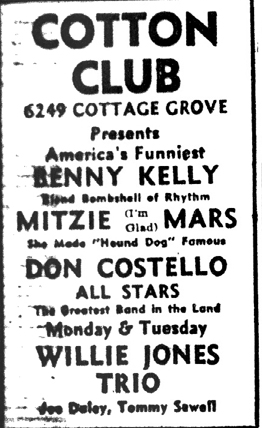
From late July through September 1953, the Cotton Club at 6249 South Cottage Grove had Willie Jones' Combo in on Monday and Tuesday nights (later changed to Tuesday and Wednesday nights); the indefinite contract was posted on August 6. Jones worked in a trio with Joe Daley (saxes) and Tommy Sewell (bass). Bennie Kelly (billed as the "comedy king") was the MC.
We previously thought that Willie Jones played on two sessions with Red Holloway's band for Chance, backing doo-wop groups. The sessions at issue were by the Moonglows on September 27, 1953 and January 10, 1954. Red Holloway told us, however, that he used his regular group, with Louis Carpenter on piano, on these sessions. However, Red also said of Carpenter that "He learned everything from Willie." These sessions can now be found in Appendix B of our Al Smith discography, Part II.
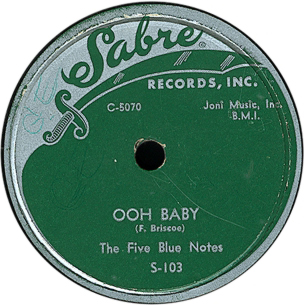
The Five Blue Notes: Andy Magruder (lead); Fleming Briscoe (lead, tenor); Jackie Shedrick (1st tenor); Robert Stroud (2nd tenor); Moise Vaughn (baritone / bass); with prob. Al Smith (ldr); James "Red" Holloway (ts except -1); prob. Willie Jones (p except -2); Lefty Bates (eg); prob. Quinn Wilson (b); Paul Gusman (d).
Universal Recording, October 21, 1953
| C-5070 | Ooh Baby (Briscoe) | Sabre S-103, Constellation CS 5, Famous Groove [F] FG.971016 [CD] | |
| C-5071 | My Gal Is Gone (Briscoe) -1 | Sabre S-103, Constellation CS 5, Famous Groove [F] FG.971016 [CD] | |
| S-5072 | You Gotta Go Baby | Sabre SA 108, Constellation CS 5, Famous Groove [F] FG.971016 [CD] | |
| S-5073 | The Beat of Our Hearts -2 | Sabre SA 108, Constellation CS 5, Famous Groove [F] FG.971016 [CD] |
Sabre S-103 was a single (45 and 78 rpm) released in December 1953. Sabre SA 108 followed suit around June 1954. Constellation CS 5, an LP titled Groups Three, was issued in 1964. A bootleg reissue on CD (Famous Groove FG.971016) came out in 1997 under the title Groups Three Plus; it added the two Wally Wilson sides from this session and items that the Five Blue Notes and the Five Chances recorded for other labels.
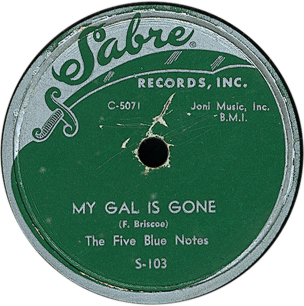
Robert Pruter, Doowop: The Chicago Scene, is the source for the personnel of The Five Blue Notes. Instrumentalists were identified by ear. The balance is unusual for an Al Smith band: guitar very much to the forefront, piano recessed (in fact, the piano is completely absent from "The Beat of Our Hearts," while prominent guitar chording takes its place). Paul Gusman uses brushes. Red Holloway has a tenor solo on "Ooh Baby" and another one on "You Gotta Go, Baby." He is heard only on the final two bars of "The Beat of Our Hearts."

Wally Wilson (voc -1) with The Five Echoes: Earl Lewis (1st tenor); Johnnie Taylor (2nd tenor); Constant "Count" Sims (baritone); Herbert Lewis (baritone); Jimmy Marshall (bass); accompanied by prob. Al Smith (ldr); Red Holloway (ts); McKinley Easton (bars); Willie Jones (p); Lefty Bates (eg); prob. Quinn Wilson (b); Vernel Fournier (d).
Universal Recording, Chicago, January 17, 1954
| C5102 | So Lonesome | Sabre SAB-105, Constellation CS-5, Famous Groove [F] FG.971016 [CD] | |
| C5103 | Broke (Spriggs) | Sabre SAB-105, Constellation CS-5, Famous Groove [F] FG.971016 [CD] | |
| C5104 | If You Don't Love Me^ -1 | Sabre S106, Famous Groove [F] FG.971016 [CD] | |
| C5105 | The Hunt^ -1 | Sabre S106, Famous Groove [F] FG.971016 [CD] |
Sabre S105 and S106 were 45 and 78 rpm singles, released in February and March 1954. Sabre S105 was reissued in 1964 on a Constellation LP CS-5, titled Groups Three. A bootleg reissue on CD (Famous Groove FG.971016) came out in 1997 under the title Groups Three Plus; it added the two Wally Wilson sides from this session and items that the Five Blue Notes and the Five Chances recorded for other labels.
Personnel for the Five Echoes were supplied by Robert Pruter in Doowop: The Chicago Scene. Instrumentalistswere identified by ear. Red Holloway accompanies the stage sobbing on "So Lonesome" and has a full-fledged solo on "Broke." He also solos on "The Hunt," with prominent accompaniment by Willie Jones.
The other four sides that the Five Echoes recorded for Chance used the band of Ike "Fats" Cole. Besides Cole's piano, they probably included Percy Payner on bass and Charlie Williams on drums, along with an unidentified tenor saxophonist.
The Flamingos: Sollie McElroy, Zeke Carey, Jake Carey, Johnny Carter, Paul Wilson (voc); with Al Smith (ldr); Red Holloway (ts); McKinley Easton (bars); Willie Jones (p); prob. Quinn Wilson (b); Vernel Fournier (d).
Universal Recording, Chicago, February 17, 1954
| C-5132 | Cross over the Bridge | Chance 1154, Vee-Jay LP 1052, Constellation CS-3, Instant 5072 [CD] (UK), Vee-Jay 706 [CD], Uggh 501 [CD] | |
| C-5133 | Listen to My Plea | Chance 1154, Constellation CS-3, Vee-Jay 706 [CD], Uggh 501 [CD] |
All personnel identifications by ear. Chance 1154 was released in March 1954. There is more than one kind of repro of this single. "Cross over the Bridge" and "Listen to My Plea" feature solos by Red Holloway and prominent accompaniments by Mac Easton. The piano comping beneath the tenor solo on "Listen to My Plea" sounds like Willie Jones.
Two out of the Flamingos' 9 sides from the Chance period with Red Holloway or Al Smith bands were also reissued in 1990 on Rhino CD 70967, The Best of the Flamingos. Details still need to be filled in.
After his stay at the It Club, Willie Jones joined a trio at the Esquire Lounge. Betty Dupree Overton (to use her married name—her husband was tenor saxophonist Timothy Overton) was the contractor on the gig. Her indefinite contract was posted on April 1, 1954. The trio moved to the Streamliner for 4 weeks (contract posted on April 15.) The Streamliner had previously featured Ernie Harper, Claude Jones, and Don Shirley, among others.
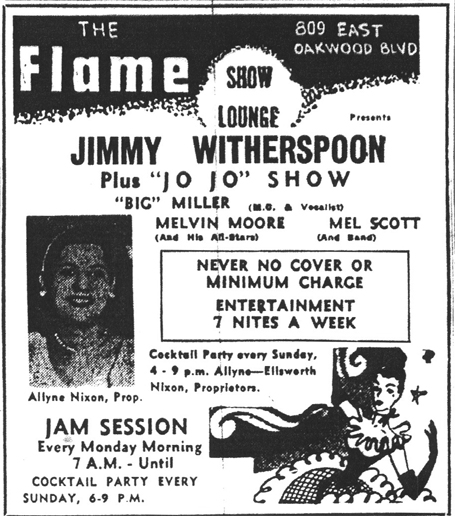
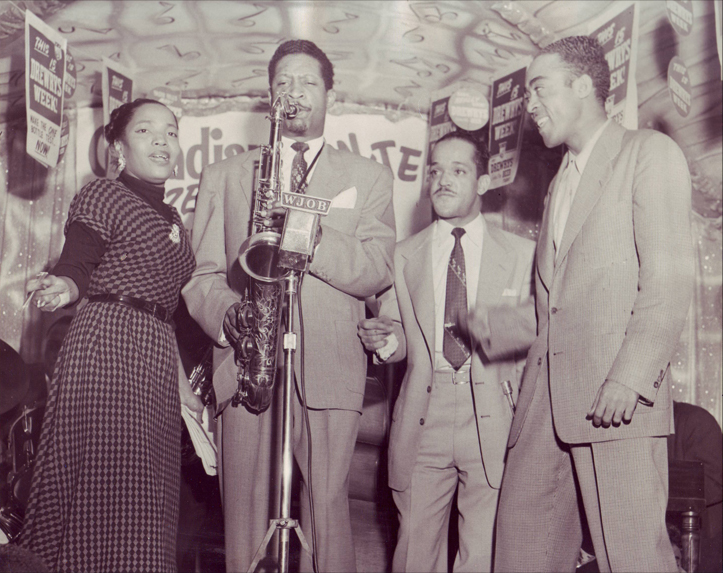
After these two engagements, it appears that the entire trio (Willie Jones, Betty Dupree, and Earl Phillips) became the rhythm section for Melvin Scott when he took over as sole house band leader at the Flame Lounge around the end of May. (During April, Scott and previous house band leader Melvin Moore overlapped at the club. Scott's contract for 1 year at the Flame, which was located in the Morocco Hotel, was accepted and filed by Local 208.) We know that Willie and trio were there later, and there is no mention of either Willie Jones or Betty Dupree as a leader in the Local 208 contract lists for the rest of 1954.
Melvin Scott was born in Chicago on August 28, 1926 (we owe the date of birth to his son Daryl Scott, email communication of August 27, 2011). Scott was a tenor saxophonist of the Lestorian persuasion, and an inspiration to a neighborhood kid named John Gilmore. Unfortunately, Melvin Scott recordings are even rarer than Willie Jones recordings. We have found just one: the December 1948 session by Eugene Wright and the Dukes of Swing for Aristocrat, where Scott was responsible the final solo on "Dawn Mist" and probably for the tenor sax solos on the group's three other sides. Willie must have been glad that he and Melvin sorted out their dispute back in May 1950...
Willie Jones made just one session as a leader (with the former Betty Dupree trio, now incorporated into the Melvin Scott quartet). This unique break came from Vee-Jay Records, then just a year old. The company recorded the trio during a marathon session on June 30, 1954. Vivian Carter and Jimmy Bracken weren't too sure what to do with the sides, and waited 6 months before releasing a single from the session. What did Chicago record buyers think about in January 1955? Willie Jones' wildest solos were often done on the simple framework of the 12-bar blues. But by 1954, he had developed his mature style—which resembled a cross between Milt Buckner and Cecil Taylor (and Cecil would not make his first record until September 14, 1956).

Willie Jones (p); Betty Dupree (b); Earl Phillips (d).
Universal Recording, Chicago, June 30, 1954
| 54-165 | Betty's Mambo | unissued | |
| 54-166 | Willie's Blues | unissued | |
| 54-167 | My Thing (Jones) | Vee-Jay 121, Top Rank [Fr] LP 111 | |
| 54-168 | My Other Thing (Jones) | Vee-Jay 121, Top Rank [Fr] LP 111 |
Our information is from the back liner of Top Rank RLP 111 (a French compilation of Vee-Jay material, released in 1962), and from Mike Callahan's Web page The Vee-Jay Story. The background research for the Top Rank LP was done by Kurt Mohr, as was the actual compilation. Our thanks to Big Joe Louis for obtaining the matrix numbers for the two unissued sides from the Vee-Jay Master Book; we had previously listed them here without numbers.
Vee-Jay 121 was released in a batch of five singles, in January 1955. Of the five that were advertised together in Cash Box on January 22 (p. 29), Vee-Jay 120, by the Holy Gospel Singers, was reviewed in Cash Box but not advertised again. Vee-Jay 122, consisting of organ solos on hymns by Maceo Woods, was also reviewed and not advertised again, though it found a niche with gospel buyers without needing more from the trade papers. Vee-Jay 124 and 125, by the Rhythm Aces and Tommy Dean's combo with Joe Buckner, were reviewed and kept being advertised. Vee-Jay 121 was neither reviewed nor advertised again in Cash Box, and the company held off further jazz releases for three months (for Vee-Jay 135 by Wardell Gray; Vee-Jay 143 by Turk Kincheloe was announced in late February but actually hit the market in late May). The record is very rare today and we wonder how widely it was heard at the time. Andrew Hill and Sun Ra didn't need it; they could go wherever Willie Jones was currently performing. We are not so fortunate now.
On July 2, 1955, Vee-Jay took out an ad for the 13th anniversary of Cash Box magazine. It included the names of everyone Vivian Carter, Jimmy Bracken, Ewart Abner, and Calvin Carter considered their active talent roster. Willie Jones was already ancient history to them; like ProClam and Floyd Jones, he wasn't mentioned. Earl Phillips was on the list, but only because had a release coming out from a session he'd made in May 1955, with Billy Boy Arnold and Morris Pejoe.
Willie Jones was definitely a jazz artist, but Lord has no listing for him as a leader. And Vee-Jay 121 is a crucial document of the Chicago jazz scene in the early 1950s, yet it was reissued once—in 1962.
During the summer of 1954, Chance was winding down (Art Sheridan would close the company at the end of year), and the opportunities to accompany vocal groups were shifting to other labels. Al Smith had begun working at United and States and Vee-Jay. But the calls that Willie Jones got for session work came from Al Benson's Parrot and Blue Lake operations.

The Flamingos: Nate Nelson (lead); Johnny Carter (1st tenor, falsetto); Zeke Carey (2nd tenor); Paul Wilson (baritone); Jake Carey (bass); with Al Smith (ldr); Cliff Davis or Lucius "Little Wash" Washington (ts); poss. Willie Jones (celeste -1, p); prob. Quinn Wilson (b); Lefty Bates (eg); Paul Gusman (d).
Universal Recording, Chicago, c. July 1954
| P 53208 | On My Merry Way | Parrot 808, Checker LP 1433, Relic CD 7053 | |
| P 53209 | Dream of a Lifetime -1 | Parrot 808, Relic CD 7053 | |
| P 53210 | If I Could Love You | Chess ACRR-702, Relic CD 7073 | |
| P 53211 | I Really Don't Want to Know | Parrot 811, Relic CD 7053 |
Parrot 808 was a 78 and 45 rpm single released in August 1954. Parrot 811 was a 45 and 78 rpm single released in December 1954.
Relic CD 7053 was a various-artists collection released in 1993 under the title The Golden Era of Doowops: The Groups of Parrot Records. Relic CD 7073, its companion volume, was released in 1994 as The Golden Era of Doowops: The Groups of Parrot/ Blue Lake Records.
Robert Pruter (in Doowop: The Chicago Scene) gives the lineup for the Flamingos. Instrumentalists identified by ear by rlc. For Willie Jones, check the piano intro and accompaniment on "Merry Way;" however, Red Holloway does not think that the "open knife chords" are part of Willie's style. The tenor sax solo on "Merry Way" is by Lucius Washington or Cliff Davis; it incorporates a Bird lick that Red said they used and he didn't.
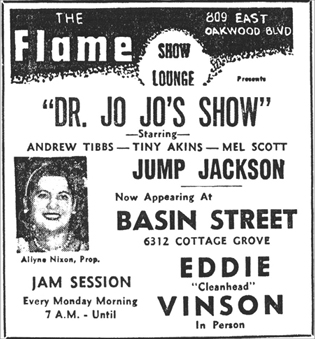
Defender advertisements show that Willie Jones divided 1955 between appearances with his trio and gigs in which the same trio formed the rhythm section of the Melvin Scott Quartet. On February 26, 1955, the Flame Show Lounge (809 East Oakwood Boulevard) advertised Willie Jones, Betty Dupree, and a drummer identified only as Charlotte as members of the Melvin Scott Band. In March, Charlotte was replaced by Phil Thomas. On April 9, 1955, the Flame advertised the Scott Band, featuring Willie Jones, Betty Dupree, and Phil Thomas. On July 30, 1955, the Willie Jones Trio was holding forth at the Cabana Gardens (2711 South Wentworth); on August 27, they were still there. In the August 8, 1955 issue, the Defender elaborated that "...With Willie Jones Trio first half of the week and Tommy 'Madman' Jones for weekends, the Cabana Gardens, 2711 Wentworth, jumps every night." (Our thanks to Dan Kochakian for locating this reference.) Willie and Tommy Jones would work together again in the 1960s and 1970s.
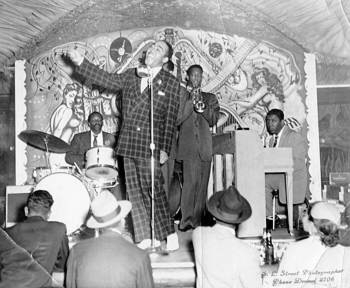
On August 8, 1955 the Flame once again had the Melvin Scott Band, featuring Jones, Dupree, and Thomas ("Chicago Nighteries on Swing, Bop Kick, New York Age, October 8, 1955, p. 8). The same lineup was mentioned in the Defender for September 3, 1955. They were playing Thursdays through Sundays, while Jump Jackson's band held down the other three days. And on October 22, 1955, Willie Jones (piano), Betty Dupree (bass), and Phil Thomas (drums) were still members of the Melvin Scott Band, according to another Defender ad for the Flame Show Lounge.
Such demand as there was for Willie's services in the studio came from work behind vocal groups; Willie worked with Al Smith and the usual suspects for Parrot and Blue Lake. The first call pianists for this kind of studio work were Horace Palm and Norman Simmons, so Jones' opportunities were somewhat limited. It is also interesting that he never worked any of the Smith-led sessions for either Vee-Jay (where, in fact, most of the work was) or United and States. Did Al Benson specifically request him for some of the Parrot/Blue Lake sessions?
The Fascinators: Clarence Smith (1st tenor); Jerry Potter (2nd tenor); Earl Richardson (baritone/tenor); Donald Blackshear (baritone); Bob Rivers (bass); with Al Smith (ldr); Red Holloway (ts); Willie Jones (p); prob. Quinn Wilson (b); Vernel Fournier (d).
Universal Recording, Chicago, March 14, 1955
| BL-55228 | Can't Stop | Blue Lake 112, Relic CD 7073 | |
| BL-55229 | Don't Give My Love Away | Blue Lake 112, Relic CD 7073 | |
| P 55230 | My Beauty, My Own | unissued | |
| ? | But I'll Remember | unissued |
Blue Lake 112 was a 78 and 45-rpm single released in May 1955. Jerry Potter of the Fascinators told Robert Pruter that he recalled doing the session (at Universal Recording, Studio A) in the early fall of 1954. Interpolation in the Parrot matrix series gives us a recording date around April of 1955. And on the c. 1959 list of Parrot and Blue Lake master tapes leased to Chess, three titles by the Fascinators are said to be in the same tape box as sides by bluesman J. B. Lenoir, which are usually said to have been recorded on March 14, 1955. The matrix number for "My Beauty, My Own" also comes from the 1959 list, which does not mention the fourth title from this session; it could be that Al Benson rejected it.
We got the personnel of The Fascinators from Robert Pruter, Doowop: The Chicago Scene. The instrumentalists were identified by ear.
The next session, with the Five Chances, Lou Mac, and the Palms, appears to use the exact same instrumental lineup as the Fascinators session did. However, Al Smith and company did not get the first call to play on it. Blues pianist Bob Call was asked to accompany the Five Chances and Lou Mac on a session that took place on May 4, 1955. (Note that Call shared the composer credit on Lou Mac's "Baby.") Call brought in a group with Johnny Griffin (tenor sax), Lee Cooper (guitar), Truck Parham (bass), and Richard Barnett (drums) but the session was a complete debacle. Al Benson rejected every track recorded that day, and refused to pay Call for his work on it. Call filed a claim against Benson with Musicians Union Local 208 and the matter was thrashed out over two meetings of the Local 208 Board (May 19 and June 2, 1955). (The vocalists were not named in the proceedings, but it was made clear that Call's band was going to accompany one group of vocalists for 2 tracks and a different group for another two.) So Benson put together another session in late May (judging from the tape box numbers on the 1959 list of Parrot master tapes) to remake all four tracks, and this time he used an Al Smith group.

The Five Chances: Johnny "Chubby" Jones (tenor, lead), Darnell Austell (lead), Reggie Smith, Howard Pitman, Harold Jones (voc); Lou Mac [Lou McClinton] (voc) with the Palms: Wilbur Williams (lead); Murrie Eskridge (1st tenor); O. C. Perkins (2nd tenor); Willie Young (voc); M. C. Ward (voc); accompanied by Al Smith (ldr); Red Holloway (ts); Willie Jones (p); prob. Quinn Wilson (b); Vernel Fournier (d).
Universal Recording, Chicago, late May 1955
| 55-129 | All I Want (Five Chances) [FC voc] | Blue Lake 115, Relic CD 7073 | |
| 55-130 | Shake a Link [FC voc] | Blue Lake 115, Relic CD 7073 | |
| BL-55131 [55129 on label] |
Slow Down [LM, P voc] | Blue Lake 114, Relic CD 7027, Relic CD 7073 | |
| BL-55132 [55130 on label] |
Baby [LM voc] | Blue Lake 114 |
Blue Lake 115 was a single released in August 1955. Blue Lake 114 appeared in July 1955.
Relic CD 7027 was a a various-artists collection released in 1992 as Rockin' at Midnight at the Parrot Club. Relic CD 7053 was a various-artists collection released in 1993 under the title The Golden Era of Doowops: The Groups of Parrot Records. Relic CD 7073, its companion volume, was released in 1994 as The Golden Era of Doowops: The Groups of Parrot/ Blue Lake Records.

There was some obvious confusion over the matrix numbers from this session; the labels of Blue Lake 114 disagree with what was engraved in the vinyl.
We got our personnel for the Five Chances and the Palms from Robert Pruter's Doowop: The Chicago Scene. The instrumentalists were identified by ear by rlc, with corrections by Vernel Fournier. Fournier confirmed that he was on drums; he identified the bassist as Quinn Wilson. Fournier also believed that the tenor saxophonist was Little Wash, but because the similarity between the playing here and Red Holloway's work on other sessions from this period, we have stuck with Red as the tenor player. There were just two sides by each artist and the backing is identical; the 1959 tape list confirms that all four were done at the same session.

The Orchids: Gilbert Warren (lead, 1st tenor); Robert C. Nesbary (2nd tenor); Buford Wright (bass); "Charles" (baritone); with Al Smith (ldr); Red Holloway (ts); Willie Jones (celeste -1; p); Lefty Bates (eg); prob. Quinn Wilson (b); Paul Gusman or James Slaughter (d).
Universal Recording, Chicago, September 1955
| P-55269 | I Can't Refuse (The Orchids) | Parrot 819, Relic CD 7053 | |
| P-55269 [alt.] | I Can't Refuse | Relic CD 7073 | |
| P 55270 | Met a Girl on the Corner* | Relic CD 7073 | |
| P-55271 | You Said You Loved Me (The Orchids) -1 | Parrot 819, Relic CD 7053 | |
| P 55272 | You Have Two (I Have None) | Relic CD 7053 |
See our Parrot pages for a complete description of recordings on the label. Interpolation in the Parrot/Blue Lake matrix number series suggests a recording date in September 1955. The list drawn up in 1958-1959, of Parrot and Blue Lake master tapes in the possession of Chess Records, puts this session in tape box 3734, and gives P 55270 as the matrix number for "Met a Girl on the Corner." The title given for P 55272 is "Happiness," not a good choice of title for a lovesick lament. But "You Have Two (I Have None)" is from this session (note the absence of Lefty Bates' guitar, which was on the group's first session in April) and it is the only one that would fit. We used to think that "Hey Miss Fine" and "Fine Sweet Woman" were done on this occasion as well and not given matrix numbers. But they do include Bates, and the tape list places them back in April, on a session that Willie Jones did not play on.
Parrot 819, "You Said You Loved Me" b/w "I Can't Refuse," was released in November on 78 and 45 rpm, along with Parrot 820 by Dusty Brown and 821 by J. B. Lenoir. On November 12, 1955 (p. 27), Al Benson was talking all three up to Cash Box. Ads ran for all three on November 12 (p. 26), November 19 (p. 34), and December 3 (p. 31). By December 10, it was clear that Parrot 819 was a hit (it would be the company's last), and it got an ad all to itself (p. 38).
Relic CD 7053 was a various-artists collection released in 1993 under the title The Golden Era of Doowops: The Groups of Parrot Records. Relic CD 7073, its companion volume, was released in 1994 as The Golden Era of Doowops: The Groups of Parrot/ Blue Lake Records.
Robert Pruter (in Doowop: The Chicago Scene) identified the Orchids. Instrumentalists were identified by ear by Robert Campbell. Red Holloway is obvious and is well featured on these sides. Willie Jones takes a solo on "Met a Girl on the Corner"; Red confirmed the identification, and so did Vernel Fournier. We formerly identified the drummer on this session as Fournier, but after listening to 6 cuts from this session Fournier's judgment was that he did not play on it, because the syncopations were not his. Fournier believed that either Paul Gusman or James Slaughter was the drummer. Unfortunately, Fournier also listened to two tracks we now think were from the April session (on which he did play)—but we will stay with his judgment for now.

Willie Jones remained at the Flame Lounge into the next year. On December 1, 1955, Local 208 Board meeting minutes show that Melvin Scott posted another indefinite contract with the club (followed by still another on December 15). However, the quartet was actually performing at Basin Street, the other club owned by Allyne Nixon, who had apparently closed the Flame for remodeling. On January 19, 1956, Scott posted another "indefinite" contract with the now reopened Flame, followed by another on February 2. Advertisements in the Defender place Sccott's combo at the Flame through the end of March. After that, there is an extended period during which the Flame booked no further ads and Scott probably continued to lead the house band. The club's last hurrah took place in late October and early November, while Jo Jo Adams was still MCing but Johnny Griffin's group replaced Melvin Scott's. On November 15, 1956, Willie Jones registered a contract with the Evergreen Lounge—two months plus option. On March 7, 1957, Willie Jones posted a contract for one month plus an option at Sarno's.
With the closing of the Flame, Willie Jones lost a remarkably steady gig. With the collapse of Parrot, which Al Benson sold in March 1956, he lost his access to recording opportunities. But two more would come his way during a Duke Ellington engagement at the Blue Note (the Ducal contract for 2 weeks there was accepted and filed on August 15, 1957). Ellingtonians Clark Terry and Paul Gonsalves did some moonlighting for Argo, the recently established jazz subsidiary of Chess, and with the Duke under contract elsewhere they needed a pianist. Willie Jones was working at the Jazz Ville Lounge when these recordings were made; his contract for 3 weeks with an option was accepted and filed by Local 208 on August 1.
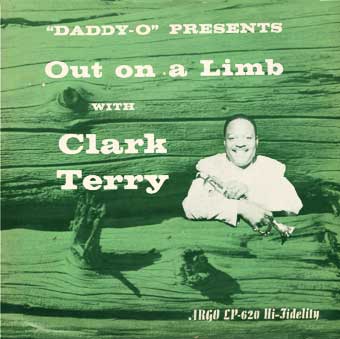
Clark Terry (tp); Mike Simpson (ts, fl); Willie Jones (p); Remo Biondi (eg); Jimmy Woode (b), Sam Woodyard (d).
Chess Studios, Chicago, probably July 26, 1957
| Caravan (Ellington-Tizol-Mills) | Argo LP 620, Chess GRD 819 | ||
| Candy (David-Whitney-Kramer) | Argo LP 620, Chess GRD 819 | ||
| Clark's Expedition (Terry-Simpson) | Argo LP 620, Chess GRD 819 | ||
| Trumpet Mouthpiece Blues (Clark Terry) | Argo LP 620, Chess GRD 819 | ||
| Phalanges* (Louis Bellson) | Argo LP 620, Chess GRD 819 | ||
| Blues for Daddy-O's Jazz Patio Blues (Terry) | Argo LP 620, Chess GRD 819 | ||
| Basin Street Blues (Spencer Williams) | Argo LP 620, Chess GRD 819 | ||
| Daylight Express (Clark Terry) | Argo LP 620, Chess GRD 819 | ||
| Taking a Chance on Love (Latouche-Fetter-Duke) | Argo LP 620, Chess GRD 819 |
The usual recording date for this session is July 26, 1957, though Michel Ruppli's Chess Discography delays that to September. However, we have discovered that Leonard Chess was already telling Cash Box about a forthcoming Argo LP with Clark Terry and Mike Simpson (or LPs with each?) on June 22, 1957 (p. 14). It's possible he was just announcing a future sesssion, but the other LPs (by John Young, Chubby Jackson, and Dick Lane) had already been recorded by this time. It doesn't help that no U7000 series matrix numbers have come down to us for the Argo LP 620 tapes (it's not the only Argo LP from 1957 for which we don't have them).
Argo LP 620 was calledOut on a Limb with Clark Terry; it was probably released in late 1957. Chess GRD 819, a CD comprising this and the next session, was released in April 1998. Its title is Clark Terry featuring Paul Gonsalves: Daylight Express. Session information from the liners to the CD. The notes to the LP mention none of the musicians except Terry and Mike Simpson.
Although Willie Jones plays throughout the album, he gets exactly one solo, 16 bars on the uptempo Swing number "Phalanges"; elsewhere he doesn't even rate a 4-bar intro. Most of the tracks are under 3 minutes long, and no one solos much except the leader and Mike Simpson—who are also the only musicians to rate a mention in the original liner notes.
Perhaps the need not to step on Remo Biondi's rhythm guitar (Biondi was basically a Swing player) kept Jones out of risky harmonic or rhythmic regions. Whatever the reason, this is some of the blandest accompaniment that Jones ever played. By contrast, on the next session, Jones' accompaniments are clearly audible and unconfined, and he gets to solo on several of the pieces.
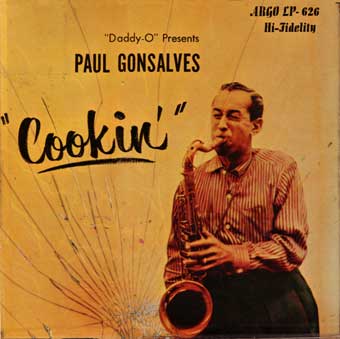
Paul Gonsalves (ts); Clark Terry (tp); Willie Jones (p); Jimmy Woode (b); Sam Woodyard (d).
Chess Studios, Chicago, August 6, 1957
| Festival (Gonsalves) | Argo LP626, Cadet [J] PLP-5006, Chess GRD 819 [CD] | ||
| Clark's Bars (Terry) | Argo LP626, Cadet [J] PLP-5006, Chess GRD 819 [CD] | ||
| Daddy-O's Patio (Terry) | Argo LP626, Cadet [J] PLP-5006, Chess GRD 819 [CD] | ||
| Blues (Gonsalves) | Argo LP626, Cadet [J] PLP-5006, Chess GRD 819 [CD] | ||
| Impeccable (Terry-Michaels) | Argo LP626, Cadet [J] PLP-5006, Chess GRD 819 [CD] | ||
| Paul's Idea (Gonsalves) | Argo LP626, Cadet [J] PLP-5006, Chess GRD 819 [CD] | ||
| Phat Bach (Terry-Smith) | Argo LP626, Cadet [J] PLP-5006, Chess GRD 819 [CD] | ||
| Milli Terry (Terry) | Argo LP626, Cadet [J] PLP-5006, Chess GRD 819 [CD] | ||
| Funky* (Terry) | Argo LP626, Cadet [J] PLP-5006, Chess GRD 819 [CD] | ||
| The Girl I Call Baby (unknown) | Chess GRD 819 [CD] |
Argo LP 626, Paul Gonsalves: Cookin', was probably released in 1958. Collectors report that it is much less common than the preceding LP. The Japanese Cadet LP came out later, in the 1970s or 1980s.
Chess GRD 819, a CD comprising this and the previous session, was released in April 1998, under the title Clark Terry featuring Paul Gonsalves: Daylight Express. Tom Lord has all of the information about this session (except for the track not issued on the LP). However, he misrenders "Phat Bach" as "That Bach" and "Clark's Bars" as "Clark's Bar."
In his liner notes to the original LP, Don Gold stated that "Willie Jones is a Chicago pianist in his late 30s, who has had his own trio and has worked with many name jazzmen in the midwest. His piano style is in the Milt Buckner tradition."
In the liner notes to the Chess CD, Clark Terry offered the following comments about Willie Jones, "He was one of the weirdest looking cats you've ever seen. He had a double set of teeth, like a barracuda. Big cat, too. He played sporadically and very strangely. But he was always on the scene, likeable cat, and everybody wanted him on the date. Aggressive type of pianist. I wouldn't consider him to be the ultimate jazz player, not to mention a good piano player."
Doug Ramsey, author of those liner notes, lets Terry's response stand without criticism (Terry is also somewhat down on Remo Biondi, who played on the previous session, while inordinately laudatory regarding Mike Simpson). Ramsey does acknowledge that the piano Jones had to play was seriously out of tune, and regarding "Funky," he says, "Jones is wild, too, in his off-kilter way, generating a whirlwind of locked-hands runs."
A third Argo session with moonlighting Ellingtonians (in this case, Clark Terry, Paul Gonsalves, Jimmy Woode, and Sam Woodyard) was recorded on September 2, 1957. Jimmy Woode was the leader, and his bandmates were joined by Porter Kilbert (alto sax) and Mike Simpson (flute). On this occasion, however, Ramsey Lewis was the replacement pianist.
Willie Jones seemed to have caught on at the "Jazyville" Lounge, as it was now spelled; he posted another indefinite contract on September 19, 1957. Jones then drops off the Local 208 contract lists until 1960. Betty Dupree, who often played bass in his trio, was listed as the leader on some gigs that he played, but we don't know which ones. He also began an association with bar-walking tenor saxophonist Cyril "Cozy" Eggleston during this period, though again we don't know how many of Eggleston's gigs he was on. But when Cozy's combo filled in during the week of Labor Day 1958 at Banks' Trocadero Lounge, the ad specified the personnel with the normal level of precision: Marie Stone Eggleston (Cozy's wife) on alto sax, Willie "James" on piano, Betty Dupree on bass, and Bugs Cochran at the drums.
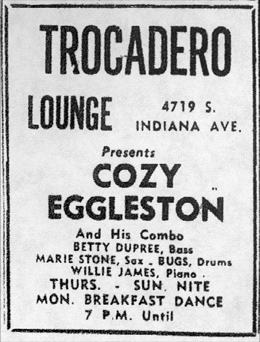
Drummer Alvin Fielder, who arrived in Chicago from Mississippi in 1958, worked in the Willie Jones trio on several occasions. He recalls Jones as a purveyor of lightning-fast runs in the Art Tatum tradition, and as fond of setting tempos that were hard to keep up with. During this period, the pianist was always nattily dressed in a blue suit.
Around this time, Willie Jones made the acquaintance of Sam Chatmon Jr., who as "Singing Sam" was regularly featured at Banks' Trocadero—usually with Lefty Bates and his trio. In 1960, Narvel Eatmon (aka Cadillac Baby) decided to record Chatmon for his Bea & Baby label. Willie Jones was recruited for what looks like a pickup band. For reasons not clear to us all these years later, Chatmon sometimes also went as "Phil Sampson." It's too bad Willie Jones didn't get the call for more blues sessions.
Sam Chatmon Jr. (aka Singing Sam, Phil Sampson) (voc); John Calvin (ts); Willie Jones (p); Lacy Gibson (eg); Bill Stepney (d).
Chicago, May 26, 1960
| It's So Hard [SC voc] ("Sampson") ^ | Bea & Baby 114A | ||
| Sampson (Eatmon) | Bea & Baby 114B | ||
| My Story | Miss 115 A | ||
| Calvin's Reserve | Miss 115 B | ||
| You're the One I Love | unissued | ||
| Say What | — |
Session information from Fancourt and McGrath's Blues Discography. Label copy from Armin Büttner's Bea & Baby 114; a listen to "Sampson," the B side instrumental, confirms Willie Jones' presence on the date. We have not heard or seen Miss 115, from a Bea & Baby subidiary; it appears to have followed the same pattern of A side vocal and B side instrumental. About the unissued sides, we know only the titles.
Bea & Baby 114 and Miss 115 were 45-rpm singles, both probably released in 1960.
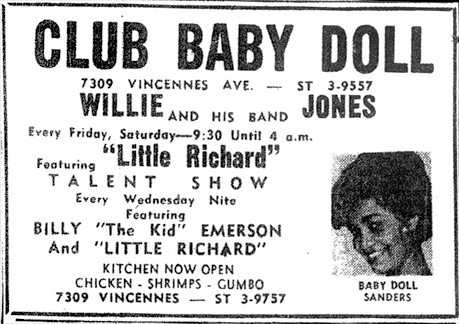
From October 1960 through March 1961, Willie Jones was in residence at Club Baby Doll (7309 Vincennes Avenue) His indefinite contract with the club was accepted and filed on October 20. The proprietor, Baby Doll Sanders, evidently had enough of a bankroll to pay for weekly newspaper ads. On October 22, the Defender advertised Willie Jones and his Band at that venue. The Little Richard who was featured with the band was evidently not the famous rock and roll singer; we are not sure who he was.
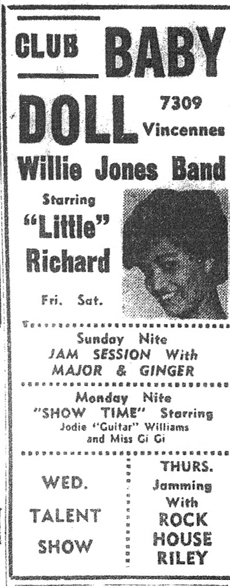
On December 16 and 17, 1960, blues belter Big Maybelle made a special appearance at the Baby Doll with Willie Jones and his combo. On January 7, 1961, the club advertised the Willie Jones Band starring Billy Jeanette. Club Baby Doll ads continued to mention the band weekly through February 11, 1961.
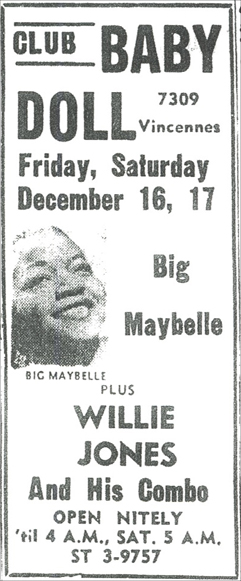
Jones kept being advertised at the Baby Doll through March 18, 1961, though in the later weeks of the run his band was reduced to playing on Friday and Saturday nights only. On April 20, he posted an indefinite contract with the Casa Madrid. According to the March 18 issue of the Defender, Betty Dupree was opening as a leader at the West Side club 5thJack, where she stayed for two months. Her band personnel was not mentioned in any of the doumentation we've seen, so we don't know whether Willie was working with her for any portion of this high-profile gig.
The last advertisement for Willie Jones in the Defender appeared on December 12, 1961, when The Talk of the Town in Phoenix, Illinois, announced that the Willie Jones All Star Jazz Trio would be appearing Friday, Saturday, and Sunday.
On May 3, 1962, Willie Jones posted an indefinite contract with the Talk-of-the-Town (as the Local 208 list rendered it). After that he dropped off the contract list again. However, we know that in 1962 and 1963, Jones worked in a band led by Cozy Eggleston, who is mentioned with fair regularity on the contract list during those years. Alvin Fielder was the drummer in this ensemble (he would soon join the circle around Muhal Richard Abrams that became the AACM).
During the early 1960s, Willie Jones also maintained a trio that worked the clubs around 63rd and Cottage Grove in Chicago. Dave Shipp was the usual bassist and William "Bugs" Cochran, who had played in several editions of the Sun Ra Arkestra from 1956 through 1959, handled the drums. Sometimes the group added a sax player and became a quartet.
On December 16, 1965, less than a month before Local 208 completed its merger with Local 10, Willie Jones posted a contract with The Red Head Lounge.
According to Bobby Blevins, Willie Jones had a drinking habit to rival Tom Archia's. This may well explain why he didn't make more records. Blevins says that Willie Jones could sing, too, but none of his vocals seems to have been preserved. Harold Ousley mentioned Jones' "nice voice." Jones' vocal specialty that got to people was something called "Night and Day" (not the Cole Porter tune). Lucius Washington recalls Willie Jones singing "Tenderly" (with his own words) and a number called "Boot Whip." According to Vernel Fournier, Jones had composed a little jingle for the "The Willie Jones Show" that he would sing at the beginning of each set.
The last two recording sessions are tough to date. Tommy "Mad Man" Jones (1922-1993) was a bar-walking tenor saxophonist who was based in Chicago for most of his career. In 1957, frustrated that his drawing power in the clubs had not translated into recordings, he started his own labels, Mad and M&M. The production of singles on these labels died down after the early 1960s but then revived for a while toward the end of the decade. Tommy Jones also put out four LPs on M & M. His first LP for the label (perhaps issued as early as 1963, perhaps several years later) included five tracks done with a combo that included Willie Jones (who, we repeat, was not a relative of Tommy's).
Tommy "Madman" Jones (ts); Willie Jones (p); Leo Blevins (eg); Betty Dupree (b); Marshall Thompson (d -1); Gil Gray (d -2).
Webb Recording Studios, Chicago, poss. 1963
| Willow Weep for Me* (Ronell) -1 | M&M LM-27 | ||
| Since You've Been Gone (T. Jones) -1 | M&M LM-27 | ||
| Slow and Low (T. Jones-W. Jones) -2 | M&M LM-27 | ||
| Simp Green* (T. Jones) -2 | M&M LM-27 | ||
| Not Yet (T. Jones) -2 | M&M LM-27 |
This session produced five of the ten tracks on M&M LM-27, A Different Sound LM-27 follows George Green's LM-26 in the catalog number series, which was recorded in 1963. And the remaining 5 tracks on LM-27 appears to have been recorded in 1961 in a group with Jack Wilson at the piano and Roland Faulkner on guitar (see session Mad21 on our Mad/M&M page). So we have tentatively estimated the recording date here as 1963, but it could be later, even substantially later.
Our information about the session comes from Bob Schwartz's notes to the LP, which was brought to our attention by Dick Shurman, and covered in an article by John Corbett (on worthy LPs that have yet to be reissued on CD) in Down Beat, December 2004. Note the presence of Willie Jones' long-time bassist, Betty Dupree. Marshall Thompson is the drummer on two ballads; Gil Gray was brought in for two rock numbers, "Simp Green" and "Not Yet," and is also responsible for the blues "Slow and Low."
Willie Jones does not solo on "Since You've Been Gone," a ballad feature for Tommy Jones' tenor sax that clocks in under 3 minutes. But his solo on "Willow Weep for Me" is a cascading delight. Though he shares the composer credit for the slow blues appropriately titled "Slow and Low," he doesn't solo on it. He also solos on one of the rock numbers, "Simp Green," which had its own dance step to go with it, but sounds like a boogaloo.
Bob Schwartz's notes to A Different Sound make a passing reference to "Willie Jones (who will soon be featured on an M&M album)." So far as we know, the plans for that one fell through, but four sides with Willie Jones did see inclusion in Tommy Jones' fourth and final LP for M&M. The LP was released in the early 1980s, while Tommy Jones was living in California. Side A, without Willie Jones, takes a "smooth jazz" approach and seems to have been recorded with California-based musicians shortly before its release.
Side B (which includes Willie Jones and other Chicago-based performers) was recorded in Chicago at an earlier date. Over the titles for Side B is the heading, "A Tribute to Willie Jones (Pianist Extraordinaire!)." Bugs Cochran (along with bassist Dave Shipp) was a regular member of the Willie Jones Trio in the late 1960s and early 1970s, when the group worked in clubs on the South and West Sides; Cochran also worked regularly with Tommy Jones. Assuming that the other three Tommy Jones LPs were recorded earlier, an early 1970s date seems most likely for this material.
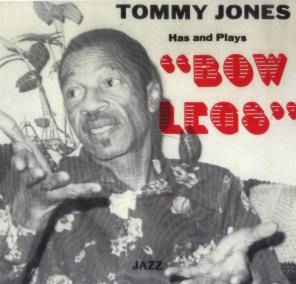
Tommy "Mad Man" Jones (ts); Willie Jones (p); Larry Frazier (eg, voc); Bruce Hayden (vln -1); Eldee Young (b); William "Bugs" Cochran (d); Phil Thomas (cga, voc).
Chicago, prob. early 1970s
| Good Thang | M & M TD5516 | ||
| 47123-1 | Sweet Lena (Frazier) | M&M 47123, M&M TD-5516 | |
| Dream Samba -1 | M&M TD-5516 | ||
| 47123-2 | Larry's Blues (Frazier) | M&M 47123 |
This LP is listed in Tom Lord's Jazz Discography. Lord gives the date as the 1980s, but that is the release date, not the recording date for the material. M&M TD5516 was an LP titled Bow Legs. The LP cover gives a California P.O. box for M&M.
An M&M single (on 45 rpm, in stereo) from this session was discovered in March 2013. It carries "Sweet Lena" on one side and the previously unknown "Larry's Blues" on the other. We don't know the release date, but it was probably well in advance of the album.
The session was done professionally in a studio, in stereo. "Good Thang" is pure bebop and features Willie Jones extensively. "Larry's Blues" is a feature for Larry Frazier's guitar; it also allows Tommy Jones to show off his jazz-funk chops, but doesn't give Willie Jones so much to do. The other two cuts on this session and the two on the following session are somewhat mellowed out barwalking material. Of the very rare appearance on record by Bruce Hayden, jazz violin scholar Anthony Barnett says, "although Hayden only plays obbligato violin on one track Dream Samba his breathy tone is quite beautiful and begins to explain why Leroy Jenkins has paid tribute to him as a teacher."
Tommy Jones (ts, voc, perc); Willie Jones (p); George Freeman (eg); Betty Dupree (b); Phil Thomas (cga, voc except -1); William "Bugs" Cochran (d).
Chicago, prob. early 1970s
| Since You've Been Gone (T. Jones) | M&M TD-5516 | ||
| Fleur (T. Jones) -1 | Mad A1 [CD] |
These two sessions are Willie Jones' last recordings. They are also among the last ones that Tommy Jones cut in Chicago.
We think that this is a different version of "Since You've Been Gone" from the one that appeared on M&M LM-27, but comparative listening is still needed.
"Fleur," with the same basic lineup as "Since You've Been Gone," appears to be from the same session. It was first released in 1991, on Tommy Jones' last production, a CD issued in the Netherlands and titled Tommy "Madman" Jones & His Friends: Chicago Style 1960-1976.
Our information about the Bow Legs LP comes from Lord's Jazz Discography.; our thanks to Arjen Gorter for alerting us to Tommy Jones' CD. "Since You've Been Gone" and "Fleur" reunited Willie with his 1954 rhythm section: Betty Dupree and Phil Thomas.
According to records in the Chicago Federation of Musicians Death Files 1940-1979 (these are not reliable before January 1966, when the merger of the old White Union Local 10 and the old Black Union Local 208 was completed), Willie Jones made $3923.50 off paying gigs that he reported to the Union in 1966. 1969 was another relatively good year, with $2905 in wages from paying gigs, then Willie Jones' earnings dropped sharply in 1970 and 1971. His best year thereafter was 1972 ($5355) but in 1973 and 1974 his reported earnings were near zero (of course, he could have been playing regularly in a non-Union venue; such activities were common by this time). But it does appear that spells of ill health were keeping him out of circulation. His last productive year was 1975 ($2693).
In the 1970s, Willie Jones and his wife Beatrice Washington Jones were living at 6603 South Rhodes.
Willie Jones died of arteriosclerotic cardiovascular disease on December 31, 1977. The Union paid for his funeral, which took place on January 5, 1978; his mother signed the documents. He had been largely inactive since the middle of 1976; his declared income from paying gigs in 1977 was just $250.00, and he was having trouble catching up on his Union dues. In April 1977 he had to set up an installment plan to pay his back dues to avoid being struck off the Union list. He continued to pay in installments until shortly before his death.
Willie Jones' former bandmate Melvin Scott died in Chicago a few months later, on July 1, 1978 (again, our thanks to his son Dr. Daryl Scott for this information).
Several other musicians named Willie Jones have been active on the jazz scene. A drummer and bandleader named Willie Jones recorded in Richmond, Indiana, for Gennett way back in 1927. A guitarist named Willie Jones recorded with Fred Jackson and Ike Quebec for Blue Note in 1962. Willie Jones, III (born in Los Angeles in 1968) is a drummer who recorded with a number of leaders in the 1990s.
A slightly younger contemporary of "our" Willie Jones was William Jones, Jr. Born in New York City on October 20, 1929, this Willie Jones was a drummer. The New York Willie Jones made several significant recordings as a sideman. His first appearance on record was with Thelonious Monk (the "Friday the Thirteenth" session for Prestige, 1953). He recorded with Elmo Hope in 1955 and Randy Weston in 1956, and cut three albums with Charles Mingus, including Pithecanthropus Erectus (1956). From late 1956 to early 1959 he was the drummer in Lester Young's last band. What appears to have been this Willie Jones' last recording was done with Sun Ra (for Savoy in October 1961, right after The Ra arrived in New York). He died in New York City in April 1991.
Click here to return to the Red Saunders Research Foundation page.
Click here to return to Robert L. Campbell's Home page.